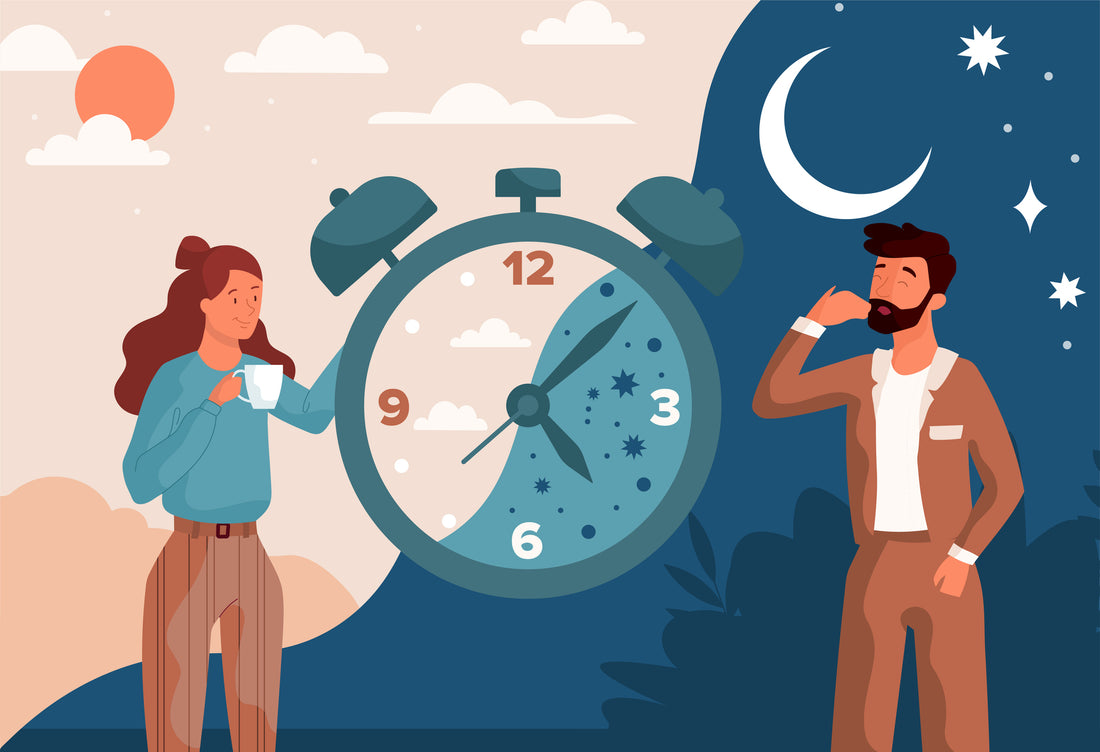How To Fix Your Sleep Schedule - Tips That Actually Work

Key points:
- Your sleep schedule can be disoriented for many reasons, such as travel, working hours, and lifestyle choices.
- The circadian rhythm, also known as your internal body clock, regulates vital body functions such as sleep schedules. Over time it can accept bad habits, which can make you not get enough sleep.
- You should try to get between 7 - 9 hours of sleep per day if you are an adult. If you’re not getting this much, you should change your sleeping routine.
- There are many ways to fix your sleep schedule, such as developing a new routine, going to bed earlier, and taking B・SYNC ON.
- The key to fixing your sleep schedule is consistency, don’t expect immediate changes; give whatever method you choose time to affect your circadian rhythm.
Do you ever wake up feeling exhausted and tossing and turning all night wrong, trying to lull your body to sleep? Do you need to set the alarm to jolt yourself out of bed on time daily? If you’re struggling to wake up at the right times, it can be quite depressing and make you feel resigned to it, but there is a way to fix your poor sleep schedule.
Every person needs different amounts of sleep and has their own personalised schedule, which depends on when you’re most active, what time of day you wake up, your job/lifestyle and mealtimes. Most people tend to wake at 7 - 9 am and sleep at 9 - 11 pm, but this doesn’t have to be the case for a good sleep schedule. The only thing that links people’s perfect sleep schedule is that you need consistency to obtain it.
Keep a weekly sleep journal to figure out your ideal sleep schedule. Write everything about your sleeping pattern, when you rise and sleep, what time you tend to eat and how many hours of sleep you get each day. You’ll need to fix your sleeping schedule if you’re getting less than 7 hours.

What Is The Circadian Rhythm?
Having an irregular sleeping pattern can be bad for your circadian rhythm. The circadian rhythm is another name for your internal body clock, which regulates your sleep-wake cycle. It makes you feel sleepy and lively at the right times. The internal clock responds to your daily patterns, so if you go to bed later and later, you can start developing a bad sleeping schedule.
Your circadian rhythm regulates your mental, physical and behavioural changes such as body temperature, sleepiness and hormone releases. If you wake up at bad times, your circadian rhythm needs to be realigned.
The best way to help your body clock is to improve your sleep hygiene. Your sleep hygiene has nothing to do with baths or brushing your teeth. When we refer to sleep hygiene, we are talking about the ideal conditions for your sleep.
Why Does A Sleep Routine Matter?
Humans are creatures of habit, so our bodies and brains want us to go to bed at the same time each day and wake up at the same time each day [1].
A consistent sleeping schedule helps us maintain our circadian rhythm, which maintains our heart rate, blood pressure and much more. Sleep deprivation, or inconsistent sleep, will make your circadian rhythm secrete less human growth hormone, which helps your body build lean muscle mass and burn fat.
If you don’t have a regular sleep schedule, you’re more likely not to get enough sleep which can start your day on the wrong foot. This can leave you grumpy, unsociable and unfocused on your daily tasks.
It is possible to fix a ‘broken’ sleep schedule. All you have to do is go to bed and the same time each day. This is easier said than done, but you can prepare yourself for sleep by developing a consistent routine [2].
The NHS recommends that a healthy adult should get between 7 to 9 hours of sleep each day [3]. It takes time to fix your sleep schedule, but if you’re consistent and diligent enough, you can fix it.

Why Do We Develop A Bad Sleeping Schedule?
Many factors affect our sleep schedule. These can range from travel to irregular work hours. However, the basic reason for bad sleeping schedules is that people don’t get enough sleep or are putting off going to bed.
If you develop a bad sleep schedule, it can be bad for your health and lead to the following consequences:
- Sleep disorders
- Obesity
- Diabetes
- Depression
- Bipolar disorder
- Seasonal affective disorder
All of these are serious issues. Not getting enough sleep can also affect your performance and alertness during the day.
Travel
Travelling is one of the main reasons why people lose control of their sleep schedule. If you travel to a different time zone, your body will not be going to sleep at its regular times, which will alter your internal body clock. Travelling can disorientate your body which can develop into a bad sleeping schedule.
Jet lag can also affect your sleeping pattern, making it hard to sleep and wake up. When you’re abroad on holiday, you often stay up later and sleep longer to enjoy your time more. This might be fun, but it can negatively affect your sleep schedule as your circadian rhythm depends on you having consistent rising and sleeping times.
Non-9 - 5 jobs
If you work a shift job, you might have irregular hours, which can lead to an inconsistent daily schedule, making it hard for your circadian rhythm to function. This disruption of your routine can leave you feeling sleepy throughout the day.
Nightshift workers who work during the night will also struggle to get enough sleep as they will probably be sleeping when it is light outside, so your body won’t be creating melatonin, which makes you sleepy. Freelancers may also experience similar issues depending on if they maintain a consistent schedule.
Night Owl or Early Bird
Some people naturally wake up earlier than others, and others go to bed later. These people’s circadian rhythm will anticipate this. However, if these people want to start changing their routines, they may struggle to alter their schedule due in part to their lack of natural light intake.
Bad Night’s Sleep
Anyone can have a bad night’s sleep for any reason. Perhaps you were out late last night, or you were procrastinating before bedtime and slowly saying, “just ten more minutes, then I’ll go to bed,” a few too many times. Or maybe you drank too much caffeine, or perhaps emotional or stress issues have kept your brain active when it should be resting.
Everyone has a bad night’s sleep, and they’re not a big deal on their own. However, one bad night’s sleep can quickly become a bad sleeping routine if you don’t deal with it quickly.
Daylight Savings
Daylight saving pushes everyone’s schedule back or forwards. So even when you’re going to bed at the same time and getting the same amount of sleep as before, your body will take some time to accept this new routine and allow your internal clock to realign.
Bluelight
Staying up late on your phone can keep you awake. The artificial light of our laptops and phones can interfere with our circadian rhythm and halt melatonin production. Avoid electronics for at least half an hour before bed to avoid upsetting your sleep schedule.

How To Reset Your Sleep Schedule
If you’re having trouble getting those all-important 7 - 9 hours of sleep each night, there are ways to re-establish a good sleep schedule. The key to fixing your routine is consistency, so be sure to keep at your preferred method even if you don’t get immediate results, as it takes time for your circadian rhythm to align with your new routine.
Try B・SYNC ON
B・SYNC ON is the world’s first clinically proven wake-up tablet. It can help you wake up feeling happy, productive and sociable. All you have to do is take the tablet 7 hours before you want to wake up. After 7 hours, B・SYNC ON will slowly release energising nutrients, waking you up carefully and gradually, meaning you won’t need to be violently jolted awake by an alarm clock. The best part about B・SYNC ON is that it’s made only with natural ingredients, namely vitamins B12 and B5, zinc, and caffeine, so you don’t need to worry about ingesting harmful chemicals.
B・SYNC ON can help you fix your sleep schedule by ensuring you wake up at a certain time. Eventually, this will help you resync your body clock with your new wake-up time. To ensure your circadian rhythm realigns with your new wake-up time, try to take our tablets regularly at the same time each day.
Avoid Big Evening Meals
Avoid having a large hearty meal in the evening as this can cause acid reflux and heartburn, which might wake you up in the middle of the night. Instead, try to eat a healthy balanced meal in the evening. If you feel hungry, try having a nutrient-dense snack like nuts, which contain many nutrients that can help your body.

Exercise At The Right Time
Daily exercise can help you reset your internal body clock. The NHS says you should try to get around 75 minutes of vigorous exercise a week or 150 minutes of moderate exercise [4]. Exercise can tire your body and get rid of excess energy. However, you should try to avoid working out in the hour before you go to bed.
When you exercise, your brain and body are active and stimulated, which raises your body temperature and heart rate [5]. Over-stimulating your body can make it tougher for you to sleep as your body will take time to slow down and be able to sleep.
If you must exercise in the hours before you go to sleep, try low-intensity workouts that won’t stimulate your brain too much and ensure you have a cool-down period after working out.
Go To Bed Earlier
Going to bed earlier might seem like a no-brainer. However, if you go to bed an hour earlier than you usually would, you’ll just be lying there waiting to sleep as your circadian rhythm won’t anticipate sleep. Instead, you should try to scale back your bedtime in small increments.
Try adjusting your bedtime by 15 minutes every few days; when you can sleep easily at that time, you can try scaling it back another 15 minutes. Make minor adjustments to make it easier for your body to adjust. Be patient with this, as it can take a while for your body to accept its new schedule. Don’t expect instant results.
Try Not To Snack
Having some healthy snacks before bedtime can be fine, but you should be careful with your intake before bedtime. Avoids sugars, caffeine and nicotine before bed as these stimulate you too much and can stop you from going to sleep.
Alcohol can make you sleepy, but it will be a low-quality sleep which won’t properly rest you. Avoid spicy or acidic snacks, which can cause heartburn or acid reflex [6]. If you’re looking for a healthy snack, try to eat nuts or fruit like kiwis that promote sleep.

Avoid Light At Nighttime
Humans aren’t nocturnal animals, even if some of us like to stay awake later than others. Light signals to our brain that it’s time to wake up, and our body clock operates depending on how much light we get and when we get it [7]. You should avoid light if you want to sleep earlier and shift your sleep schedule [8].
Light halts your body from producing melatonin, which makes us sleepy, so try to avoid light as much as possible [9]. Avoiding light can be hard if you’re a shift worker who works at night, but it is not impossible. Try to avoid blue light, such as phones, TVs and laptops, as much as possible in the build-up to bedtime, as this artificial light can also affect melatonin production.
Go To Sleep With Your Curtains Open
Sleeping with your curtains open could help you wake up if you struggle to wake up consistently. It allows your body to rise in the morning slowly and gradually slow down your body’s melatonin production.
Getting enough natural light during the day is very important as it can help you synchronise your internal clock better [10].
Establish A Bedtime Routine
Developing a good routine can signal your brain that it’s time to shut down and get to sleep. Your body can interpret recurring activities as cues that it’s time to go to bed.
These activities can be anything, but it is best if they’re relaxing and comfortable for you and aren’t too stimulating. You might consider doing yoga, meditation, reading, or even a warm bath before bed. Relaxing music can also help you mellow out in the evening. You can also try filling your room with pleasant scents, like lavender, which your brain can interpret as a signal if you smell them enough before bed.
Ensure your room isn’t too hot or cold, and maintain it at around 15 - 19℃. Sleeping at the right temperature can help you achieve good sleep [11]. Whatever routine you choose, ensure it is comfortable and nice, as it shouldn’t be a chore.

No Naps
Getting enough sleep is important but try to avoid napping during the day as it can interfere with your circadian rhythm and leave you out of sync with your internal body clock. It might stop you from being sleepy at the moment, but it will also make it harder to get to sleep later.
If you must have a nap, try to nap for no more than 30 minutes and only in the early afternoon, as any later can seriously disrupt your circadian rhythm.
Don’t Sleep In
If you sleep late, it might make sense to sleep in and regain those lost hours of sleep. However, this can negatively impact your sleep schedule as it tells your body clock that this is the right time to sleep and wake, which you might not want. Instead, you should try to wake up at the same time each morning regardless of your previous night’s sleep.
You can buy an alarm clock, take a B・SYNC ON or sleep with your curtains open to help control when your body wakes up. Try not to hit snooze or attempt to go back to sleep when you reach your desired wake-up time.
Consistency is key to this, don’t wake up at different times each day. Be as predictable with your sleep pattern as possible, as this will help your body clock understand your new routine. Try not to wake up later on weekends or holidays, or you might need to fix your sleep schedule again.
Final Thoughts
Consistency is key to fixing your sleep schedule. Give yourself time for each method you try; eventually, you will develop a healthier schedule. It’s not easy to fix your sleep schedule, and being disciplined is important but try not to be too strict on yourself as this might cause you to be sad or depressed, making it harder to get to sleep.
FAQs
Why can’t I fix my sleep schedule?
Many things can affect your sleep schedule, such as travelling, working an inconsistent job, being too stressed, daylight savings and using your phone too late at night. It can take a long time to fix your sleeping schedule, and consistency is the key to fixing it.
Can I fix my sleep schedule by pulling an all-nighter?
No. Staying awake all night means you’ll need to recuperate those lost hours later. All-nighters can damage your sleep schedule. The best way to change your sleep schedule is to slowly scale back your bedtime until it is more agreeable to your demands.
How can I force myself into a sleep schedule?
There are many ways for you to fix your sleep schedule. Your body needs between 7 - 9 hours of sleep each day. Calculate how many hours of sleep you need and when the ideal bedtime and wake-up time for you is. Once you understand your new bedtime hours, you can start changing your schedule. Try making incremental changes to your schedule. Go to bed 15 minutes earlier every few days until you reach your ideal bedtime. Avoid snacking, exercising, getting too much light or having a big meal before bedtime, as these can all affect how easy it is to get a good night’s sleep.
References
- https://pubmed.ncbi.nlm.nih.gov/26361052/
- https://pubmed.ncbi.nlm.nih.gov/31122343/
- https://www.nhs.uk/conditions/insomnia/
- https://www.nhs.uk/live-well/exercise/exercise-guidelines/physical-activity-guidelines-for-adults-aged-19-to-64/
- https://pubmed.ncbi.nlm.nih.gov/20673290/
- https://www.sleepfoundation.org/nutrition/healthy-bedtime-snacks
- https://www.ncbi.nlm.nih.gov/pmc/articles/PMC5703049/
- https://onlinelibrary.wiley.com/doi/abs/10.1111/php.12241
- https://www.healthline.com/nutrition/melatonin
- https://pubmed.ncbi.nlm.nih.gov/23910656/
- https://www.ncbi.nlm.nih.gov/pmc/articles/PMC3427038/







